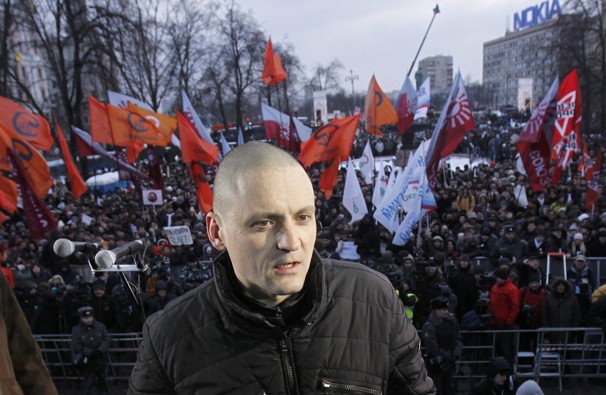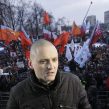
Russian Opposition Is Tested and Stiffens Under Pressure
Publication: Eurasia Daily Monitor Volume: 9 Issue: 125
By:

The lull in street protests in Moscow is seen by President Vladimir Putin’s administration as a perfect opportunity to squeeze and discredit the leaders of the disunited opposition and thus to restore the political torpor that had been the norm of his reign until last December. The ruling team also sees the need to tighten the screws now because the increase of communal tariffs and prices on many goods, from natural gas to vodka, executed this Monday might foster discontent and enrich political rallies with instantly popular economic demands (Gazeta.ru, June 29). That could make the autumnal round of regional elections highly contentious and expose at least 13 governors backed by the pro-Kremlin United Russia party to a high risk of failure (Kommersant, June 30). The much-abused “technologies” of election manipulation and falsification have become unreliable, so Putin has let loose his regime apparatus to punish and frighten the malcontents who dare to challenge his right to prevent any real modernization from happening in Russia.
The forms of pressure vary from persuading the owners of media conglomerates to fire excessively independent-minded editors and shut down some outlets, to stigmatizing such regional activists as Evgeny Roizman, who runs the campaign “City Free of Drugs” in Yekaterinburg (BestToday, June 30; Novaya Gazeta, June 28). The main instrument, however, is criminal prosecution, and Sergei Udaltsov, a charismatic speaker at the rallies, has received the final warning in the form of a “mild” sentence of 240 hours of community service for a crime he was unaware of committing (Newsru.com, June 29). Alexei Navalny, the fierce anti-corruption blogger, is under investigation together with Alexei Yashin and several other activists for allegedly organizing riots at the May 6 rally; this crime case is being prosecuted with such rigor that one of the suspects, Aleksandr Dolmatov, a designer at a missile enterprise, had to ask for political asylum in the Netherlands (Gazeta.ru, June 26). The blatant injustice of these investigations helps the motley groups in the opposition to forge a common cause and awakens many Russians out of habitual passivity (Nezavisimaya Gazeta, June 27).
A new means of discrediting the opposition is the draft legislation that would require all NGOs involved in political activism and receiving financial support from abroad to register as “foreign agents,” which in Russian is synonymous with “spies” (Moscow Echo, June 29). The draft was prepared by Aleksandr Sidyakin, an MP from United Russia. Sidyakin became famous by initiating the legislation on tougher rules for organizing street rallies and higher penalties for violating these rules, which was rushed through the parliament and signed into law by Putin on the eve of the June 12 protest march. Russian human rights activists are so concerned about this attempt to label them as “agents” that they raised the issue at their meeting with US State Secretary Hillary Clinton in St. Petersburg last Friday (Kommersant, June 30).
Irritation in the Kremlin about Western support for “subversive” NGOs is a recurrent but petty feeling compared with the angst produced by the deliberations in the US Congress on the so-called “Magnitsky bill.” This debated piece of legislation would impose heavy sanctions on officials implicated in the death of Russian lawyer Sergei Magnitsky in police custody in November 2009 (RBC Daily, June 29). The seemingly isolated Magnitsky case reveals the very heart of the pseudo-democratic system of power driven by bureaucratic predation, and so generates a furious response not only from the Foreign Ministry but also from the Communist Party and the followers of Vladimir Zhirinovsky in the State Duma (Newsru.com, 27 June). Indeed, it challenges the two fundamental propositions of Putinism: that the law enforcers are absolved of any crime providing they loyally share the profits; and that the money prudently evacuated to the West is safe (Novaya Gazeta, June 29). Opting for intimidation and targeted persecution of the opposition, Putin has to make sure that the repressive apparatus is firmly behind him and that the right to discipline the abusers remains exclusively his; so he cannot wash his hands over those who are subjected to US “harassment.”
Another case has acquired high resonance last week, involving three young women who were arrested in March and have since remained behind bars awaiting trial. Performing as the feminist punk-group Pussy Riot, their band played an anti-Putin song in Christ the Savior Cathedral. The initial reaction in the society varied from mild disapproval to indignation, but the excessive severity of the prosecution, the harsh treatment of Maria Alekhina, Nadezhda Tolokonnikova and Ekaterina Samutsevich, and their defiant dignity have swayed public opinion, so that more than a hundred well-known artists and writers published a letter of support (Moskovsky Komsomolets, Moscow Echo, June 27). Intense discussion in the media and blogosphere has brought into focus the challenge this performance posed to the political union between the Kremlin and the higher echelon of the Orthodox Church hierarchy (Moskovskie Novosti, BestToday, June 29). Both Putin and Patriarch Kirill take this challenge very personally. The carefully orchestrated court is supposed to produce a shocking punishment, similar to the merciless persecution of Mikhail Khodorkovsky, who has recently celebrated his 49th birthday, having spent the last nine years in prison (Ezhednevny Zhurnal, June 29).
Instead of restoring respect for the ruling bureaucracy and demoralizing the opposition by “shock and awe,” this round of selective and “soft” repressions brings the regime closer to implosion. Society was prepared to tolerate the abuse of power when it had the appearance of asserting the effectiveness of central control and ensuring the effectiveness of the state. Now, however, such abuses are seen as a self-serving means of extracting rents in exchange for access to levers of law enforcement, as well as a means for covering up electoral fraud. Western leaders who used to see Putin as the ultimate decider and guarantor of stability now have to treat him as yet another ailing autocrat clinging to the safety of power and attracting the electric charges of discontent. He may speak about “Russia’s European destiny” and “improving the investment climate,” but Putin irreversibly mutates into an Asian despot who cannot guarantee the security of any deal because his janissaries need loot. He may fancy brutal repressions but does not dare carry them out, and petty vindictiveness reduces him from a quasi-tsar to a transient political figure.




